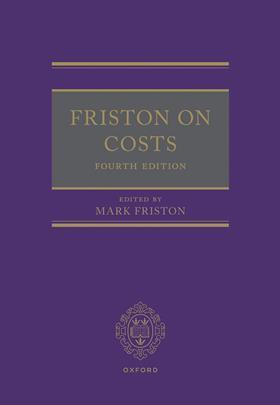A trusty guide through the costs maze
Friston on Costs (4th edition)
Mark Friston
£330, Oxford University Press
★★★★★
The first edition of this book, published under the title Civil Costs: Law and Practice, came out in 2010. A reviewer, observing the trend for costs litigation to become increasingly contentious and fraught with technical argument, predicted that a text like this was positioned to become indispensable to costs judges and those who practise civil litigation in the future.
More than a decade on, it is safe to say that the law of costs has not become any easier to navigate. Friston on Costs, now in its fourth edition, is firmly established as an authoritative, one-stop shop for a wide range of issues, from retainers and funding, through to assessment of costs, as well as a host of issues arising in between.
With ease and authority, Friston addresses the foundational principles of costs in civil litigation, as well as the much more niche and complex cost issues which may arise in particular circumstances, when representing particular persons and arising from developments in the law.

The significant expansion of many chapters, such as those on children, protected persons and litigation friends, litigation funding, security for costs, costs capping and non-party costs, provides clarity and certainty for practitioners. Updated authorities have been referenced throughout, even an examination of the Court of Appeal decision in Belsner v CAM Legal Services Ltd, which was handed down late in the publication process.
Navigation is made easy through a brilliantly straightforward index and extensive cross-referencing. Posing 10 questions to myself, I was able to quickly locate the relevant content and was satisfied with the analysis and explanation provided in every instance.
This edition is up to date to mid-2022, pre-dating the extension of fixed recoverable costs for most civil litigation claims with a value up to £100,000. While readers would have benefited from this edition including a view on how disputes arising from the new rules will likely be handled, disputes in this area must be resolved before there will be detailed guidance in this area, which will, no doubt, be included in Friston’s fifth edition.
While there is no text providing definitive advice on how to effectively manage costs under the new regime, there are plenty of areas elsewhere within civil litigation that present risks and opportunities that are better understood if a copy of this text is to hand.
Friston is highly recommended for anyone operating within civil litigation, whether as a litigation lawyer, a costs lawyer or a costs judge – its utility cannot be overstated.
Roisin O’Dubhlaoidh is a solicitor at RWK Goodman in Bath































No comments yet